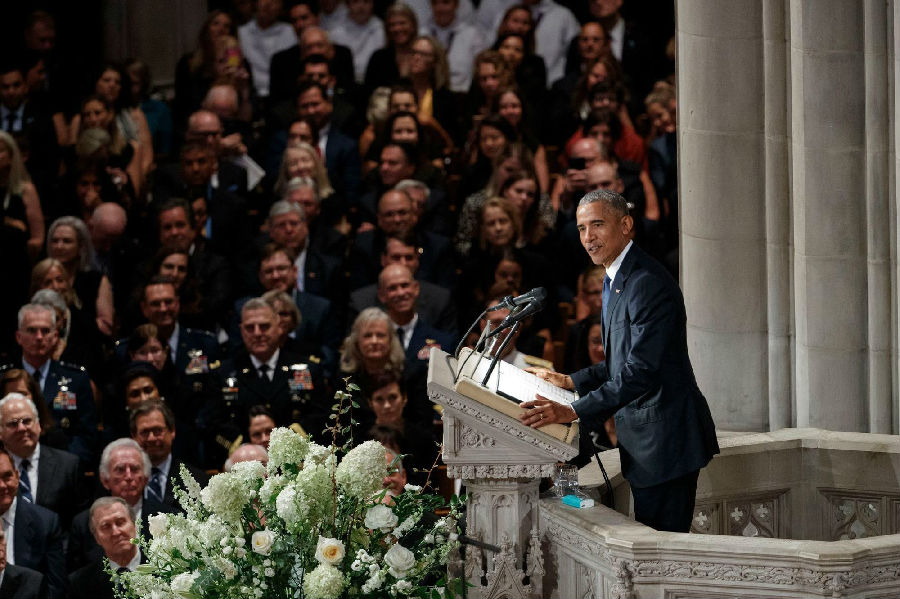They also came to mourn an ideal that he represented
他們此行也是為了哀悼麥凱恩代表的理想,
and a town that he once dominated with verve and humor and memorable flashes of temper.
以及他曾經(jīng)用氣魄、幽默和偶爾但令人難忘的發(fā)脾氣治理的那個(gè)小鎮(zhèn)。
Like Mr. McCain, many of the Republicans who attended have found themselves deeply discouraged by their own party’s president.
與麥凱恩先生本人一樣,許多出席追悼會(huì)的共和黨人都對(duì)他們的黨領(lǐng)導(dǎo)深感失望。
But unlike Mr. McCain, most of them do not say so out loud, for fear of rage by Twitter or retribution by the base.
只不過(guò),與麥凱恩先生不同的是,他們中的大多數(shù)人并沒(méi)有公開(kāi)表態(tài),因?yàn)樗麄儞?dān)心會(huì)招來(lái)總統(tǒng)憤怒的推文,或者民眾的懲罰。
It was almost as if it were a meeting of Washington’s political underground, if the underground met in a grand cathedral with 10,650 organ pipes.
紀(jì)念儀式就好像是華盛頓地下黨的一場(chǎng)集會(huì),只不過(guò)集會(huì)的地點(diǎn)是在安排了10650個(gè)管風(fēng)琴的大教堂里。
For his part, Mr. Trump spent the morning railing again on Twitter about his opponents, the news media and the investigation into his campaign’s interactions with Russia during the 2016 election.
至于特朗普先生,當(dāng)天上午他正忙著在推特上責(zé)罵他的對(duì)手,新聞媒體以及針對(duì)他2016年大選期間聯(lián)系俄羅斯的調(diào)查。
He quoted supporters asserting that the inquiry was rigged “to spy on Barrack Obama and Hillary Clinton’s political opponent” (misspelling his predecessor’s name)
他援引了他那些支持者的話,斷言調(diào)查是被操縱了,“是用來(lái)監(jiān)視巴拉克·奧巴馬和希拉里·克林頓的政治對(duì)手的”(這里他還把他上任的名字拼錯(cuò)了),
and that “this is the scandal here — a police state.”
而“我們的國(guó)家淪為了一個(gè)警察國(guó)家,這才是這個(gè)國(guó)家的丑聞。”
He complained about “corruption at the DOJ & FBI” and said the news media “has become tainted and corrupt!”
他在推文中揭露“司法部和聯(lián)邦調(diào)查局的腐敗”,還罵新聞媒體“污穢、腐敗!”
On his way to his Virginia golf club,
在去他弗吉尼亞的高爾夫俱樂(lè)部途中,
he unleashed a few more combative tweets threatening to terminate a trade agreement with Canada
他又發(fā)了幾條殺氣騰騰的推文,威脅要終止與加拿大的貿(mào)易協(xié)定,
and warning that “Congress should not interfere with these negotiations.”
還警告“國(guó)會(huì)不應(yīng)干涉相關(guān)談判。”
By the end of the day, in a possible rejoinder to Ms. McCain, he tweeted in all caps: “MAKE AMERICA GREAT AGAIN.”
當(dāng)晚,他又發(fā)了一條全是大寫的推文:“讓美國(guó)再次偉大。”,可能是在回應(yīng)約翰·麥凱恩女兒的言論。
Standing in for Mr. Trump at the cathedral were his daughter Ivanka Trump and son-in-law, Jared Kushner,
代表特朗普先生出席儀式的是他的女兒伊萬(wàn)卡·特朗普,女婿賈里德·庫(kù)什納,
as well as his chief of staff, John F. Kelly, and national security adviser, John R. Bolton,
參謀長(zhǎng)約翰·F. 凱利以及國(guó)家安全顧問(wèn)約翰·R.博爾頓,
seated not far away from former President Bill Clinton and former Secretary of State Hillary Clinton.
他們就坐在離前比爾·克林頓和前國(guó)務(wù)卿希拉里·克林頓不遠(yuǎn)的地方。
Rudolph W. Giuliani, the president’s lawyer and a longtime political ally of Mr. McCain’s, also attended.
總統(tǒng)律師魯?shù)稀ぶ炖材岷望渼P恩先生生前多年的政治盟友也出席了儀式。
Mr. McCain, who died last weekend at 81, directed his own farewell with the same contrarian spirit that flavored his political career,
麥凱恩先生,上周末逝世,享年81歲,生前規(guī)劃了自己的告別會(huì),會(huì)上要洋溢著貫穿了他整個(gè)政治生涯的"逆勢(shì)而上的精神",
And it came off just as he would have wanted.
告別會(huì)一切如他所愿。
The two-and-a-half-hour ceremony blended the majesty of the officially designated national house of prayer,
兩個(gè)半小時(shí)的儀式充滿了國(guó)家大教堂的威嚴(yán),
the discipline of his cherished Naval Academy,
麥凱恩先生珍視的海軍學(xué)院的紀(jì)律感,
and the unabashed, unapologetic patriotism of a Fourth of July fireworks display.
以及國(guó)慶節(jié)煙花表演那種毫不掩飾,心安理得的愛(ài)國(guó)主義精神。

As he battled brain cancer, Mr. McCain told his advisers months ago that he wanted Mr. Bush and Mr. Obama to speak at his funeral,
幾個(gè)月前,還在與腦癌作斗爭(zhēng)的麥凱恩先生對(duì)他的顧問(wèn)說(shuō),他希望布什先生和奧巴馬先生能夠在他的遺體告別儀式上致辭,
then called each of them to make the request.
之后他便打電話向他們發(fā)出了邀請(qǐng).
The point was to emphasize the common values that they shared despite their differences.
此舉是為了強(qiáng)調(diào),盡管他和兩人政見(jiàn)不同,但他們有著共同的價(jià)值觀。
“That’s what McCain’s trying to say,” said Mark Salter, his longtime confidant.
“這就是麥凱恩的心聲,”麥凱恩多年的密友馬克·索爾特說(shuō)到。
“The message of the whole service is supposed to be there’s a better way to do this, there’s a better way to do politics than the way we’ve been doing it lately.”
“整個(gè)儀式都在傳達(dá)著這樣一個(gè)信息:比起美國(guó)最近的表現(xiàn),我們其實(shí)可以做得更好的,我們的政治也可以發(fā)展得更好。”
Mr. Obama admitted to a “certain surprise” when Mr. McCain called to ask him to speak at his service,
奧巴馬先生承認(rèn),當(dāng)麥凱恩先生打電話邀請(qǐng)他來(lái)致辭時(shí),他的確感到“有些意外”,
but said he came to realize it demonstrated the senator’s relish for unpredictability, disdain for self-pity, largeness of spirit and mischievous streak.
但他也說(shuō),他逐漸意識(shí)到,參議員先生的舉動(dòng)顯示了他對(duì)不可預(yù)測(cè)的熱衷,對(duì)自戀的不屑,也顯示了他胸懷的廣博,以及他的一絲淘氣。
“After all,” Mr. Obama said, “what better way to get a last laugh than to make George and I say nice things about him to a national audience?”
“畢竟,”奧巴馬先生說(shuō)到,“還有什么比讓喬治和我對(duì)著全國(guó)觀眾夸他更能讓他笑到最后的呢?”
The former president noted that despite their debates,
前總統(tǒng)還指出,盡管他們有過(guò)爭(zhēng)論,
he and Mr. McCain shared a commitment to overhauling immigration and campaign finance laws,
但他和麥凱恩先生都曾致力于改革移民法案和競(jìng)選籌款法案,
and he praised the senator for his fidelity to American principles like the rule of law and a free press.
他還稱贊了參議員對(duì)法治,新聞自由等美國(guó)原則的忠誠(chéng)。
He recalled that during their 2008 contest, Mr. McCain corrected a supporter who denounced Mr. Obama as an Arab.
奧巴馬先生回憶說(shuō),2008年競(jìng)選比賽期間,麥凱恩先生還曾糾正過(guò)一位譴責(zé)他是阿拉伯人的選民.
“I was grateful, but I wasn’t surprised,” he said.
“我很感激,但我并不驚訝,”他說(shuō)。
“I never saw John treat anyone differently because of their race, or religion, or gender.”
“因?yàn)槲覐奈匆?jiàn)過(guò)約翰因?yàn)榉N族,宗教或性別而對(duì)任何人另眼相看。”
That did not mean they agreed all the time, he noted.
但這并不意味著他們總是能達(dá)成共識(shí),奧巴馬說(shuō)到。
“It’s no secret, it’s been mentioned, that he had a temper,” Mr. Obama said,
“他脾氣很大,這一點(diǎn)已經(jīng)不是什么秘密了,大家也已經(jīng)提過(guò)了。”奧巴馬先生說(shuō)到,
“and when it flared up, it was a force of nature, a wonder to behold —
“他發(fā)起脾氣來(lái),那簡(jiǎn)直可以說(shuō)是一股洪荒之量,一道奇觀 -
his jaw grinding, his face reddening, his eyes boring a hole right through you.
他會(huì)咬牙切齒,臉漲得通紅,他的眼睛仿佛要在你身上鉆出一個(gè)洞來(lái)。
Not that I ever experienced this first-hand, mind you.”
提醒你們一下,我說(shuō)這些并不是說(shuō)我自己就有過(guò)親身經(jīng)歷。”
譯文由可可原創(chuàng),僅供學(xué)習(xí)交流使用,未經(jīng)許可請(qǐng)勿轉(zhuǎn)載。


